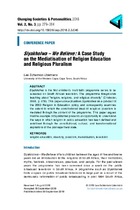| dc.contributor.author | Scharnick-Udemans, Lee | |
| dc.date.accessioned | 2019-10-04T13:12:10Z | |
| dc.date.available | 2019-10-04T13:12:10Z | |
| dc.date.issued | 2018 | |
| dc.identifier.citation | Scharnick-Udemans, L. (2018). Siyakholwa – We Believe: A Case Study on the Mediatisation of Religion Education and Religious Pluralism. Changing Societies & Personalities, 2(3), 279-284. doi:10.15826/csp.2018.2.3.046 | en_US |
| dc.identifier.issn | 2587-8964 | |
| dc.identifier.uri | https://doi.org/10.15826/csp.2018.2.3.046 | |
| dc.identifier.uri | http://hdl.handle.net/10566/4926 | |
| dc.description.abstract | Siyakholwa is the first children’s multi-faith programme series to be
screened on South African television. The programme foregrounds
teaching about “religion, religions, and religious diversity” (Chidester,
2008, p. 278). This paper conceptualises Siyakholwa as a product of
the 2003 Religion in Education policy, and consequently examines
the extent to which the constitutional ideal of religious pluralism is
mediated through the content of the programme. This paper argues
that the example of Siyakholwa presents an opportunity to understand
the ways in which religion in public education has been defined and
redefined through the constitutional, cultural, and transformational
aspirations of the post-apartheid state. | en_US |
| dc.language.iso | en | en_US |
| dc.publisher | Ural Federal University | en_US |
| dc.subject | Religion education | en_US |
| dc.subject | Diversity | en_US |
| dc.subject | Pluralism | en_US |
| dc.subject | Mediatisation | en_US |
| dc.subject | Television | en_US |
| dc.title | Siyakholwa – We Believe: A case study on the mediatisation of religion education and religious pluralism | en_US |
| dc.type | Article | en_US |

